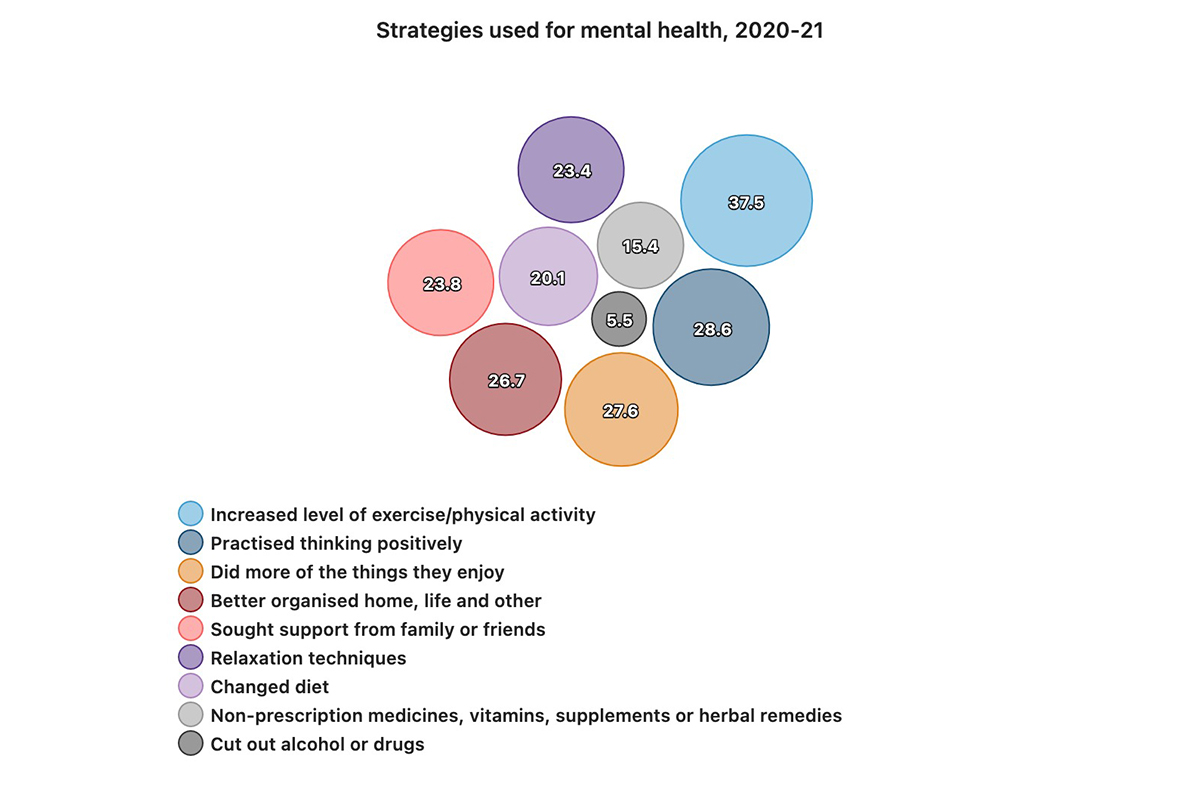
The Australian Bureau of Statistics (ABS) has just released the results of its 2020-21 National Study of Mental Health and Wellbeing. And one shocking insight from the study suggests that almost a third of Australians really don’t know how to look after themselves when it comes to mental health.
The ABS’ recent National Study of Mental Health and Wellbeing study shows that three in five Australians took action to self-manage their mental health; which is great. However, one of the ways in which people tried to self-manage or self-treat their problems isn’t so great.
Case in point, the second-most used method Aussies tried to improve their mental health; a staggering 28.6% of Australians practised ‘thinking positively’ in an attempt to better their mental health.
Of course, every self-help book and wellbeing influencer on the planet pushes positive thinking but our first thought upon seeing “practised thinking positively” in the ABS report was ‘that doesn’t really work for people who are already dealing with mental health issues, does it?’
So, DMARGE did a little digging to see if thinking positively does (or doesn’t) have any benefits to mental health. First of all, we spoke exclusively to Dr Marny Lishman, a Health & Community Psychologist, who told us positive thinking can actually be “unhelpful” in some cases.
“Yes, it’s all well and good to think positively all the time, but it can be rather unhelpful if you or others are denying how you are really feeling.”
Dr Marny Lishman

“All of our emotions are valid, and in fact, are very valuable to us because they are giving us information about our environment so that we can behave accordingly. If we are not allowing ourselves to feel the perceived negative emotions, we are not giving ourselves a chance to process them, change our actions or even space to learn and grow from experiences.”
Dr Lishman also recommended a few things Australians can – and should – be doing to look after themselves mentally.
“Physical activity, learning to be in the present moment (mindfulness and meditation) as well as connecting to other people. And of course, speaking to a professional is always very important as this can be helpful to not only get support but learn strategies to help manage your mind.”
Dr Marny Lishman
DMARGE also exclusively spoke to Dr Jodie Lowinger, Clinical Psychologist and author of The Mind Strength Method, who revealed that thinking positively can lead to “a struggle with our thoughts”, which ultimately makes mental health – especially anxiety – worse.
“The challenge with positive thinking is if we are told to just think positively or just stop being so negative, we start to get into a struggle with our thoughts which tips us into fight or flight, which is experienced as stress, anxiety, agitation or frustration.
Paradoxically, getting into a struggle with our thoughts can make anxiety worse. [Thinking positively] is different from practising strategies such as focusing on things that you feel grateful for…”
Dr Jodie Lowinger

Dr Lowinger went on to divulge how people can manage negative thoughts with “scientifically supported strategies” as opposed to getting solely focused on positive thinking.
“[Make] it a practice to have one positive focus when you wake up in the morning. This helps to take you out of the sympathetic nervous system of fight or flight, and associated adrenaline and cortisol [spikes], and stimulates positive neurochemicals, such as dopamine and serotonin.”
“Other scientifically supported strategies to help rebalance the negativity bias is keeping a gratitude journal, such as ending the day writing down three things you feel grateful for, or instead of being in the struggle to think positively, think about how you can respond with values-aligned actions or acts of kindness and compassion for yourself and others.”
Dr Jodie Lowinger
Considering that both Dr Lishman and Dr Lowinger – and this 2009 study – advise that there are better methods to improve and manage mental health than thinking positively and that the ABS’ data proves it’s a popular method among Australians, it’s clear that Australians need to be better educated when it comes to mental health and how best to manage it…
Hopefully, the government agrees with us and implements a program; which is not too unlikely as the ABS study was funded by the Australian Government Department of Health and Aged Care.
If you’re struggling with your mental health, please contact Beyond Blue, Lifeline, Suicide Call Back Service, MensLine Australia or see your GP for help.
Read Next- Signs You Have High Functioning Anxiety – & How To Cope With It
- How To Tell Whether You’re Burnt Out… Or Just Lazy
The post Grim Statistic Proves Australia Needs Better Mental Health Education appeared first on DMARGE.

0 Commentaires